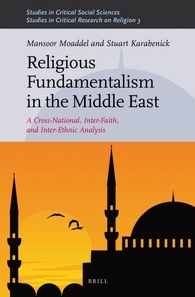08Oct 2013
New Book: Religious Fundamentalism in the Middle East
17:24 - By Administrator - Publications
Religious Fundamentalism in the Middle East
A Cross-National, Inter-Faith, and Inter-Ethnic Analysis
Mansoor Moaddel, Eastern Michigan University and Stuart A. Karabenick, University of Michigan

In Religious Fundamentalism in the Middle East, Moaddel and Karabenick analyze fundamentalist beliefs and attitudes across nations (Egypt, Iran, Lebanon, and Saudi Arabia), faith (Christianity and Islam), and ethnicity (Azari-Turks, Kurds, and Persians among Iranians), using comparative survey data. For them, fundamentalism is not just a set of religious beliefs. It is rather a set of beliefs about and attitudes toward whatever religious beliefs one has. In this analysis, the authors show that fundamentalist beliefs and attitudes vary across national contexts and individual characteristics, and predict people's orientation toward the same set of historical issues that were the concerns of fundamentalist intellectual leaders and activists. The authors' analysis reveals a "cycle of spirituality" that reinforces the critical importance of taking historical and cultural contexts into consideration to understand the role of religious fundamentalism in contemporary Middle Eastern societies.